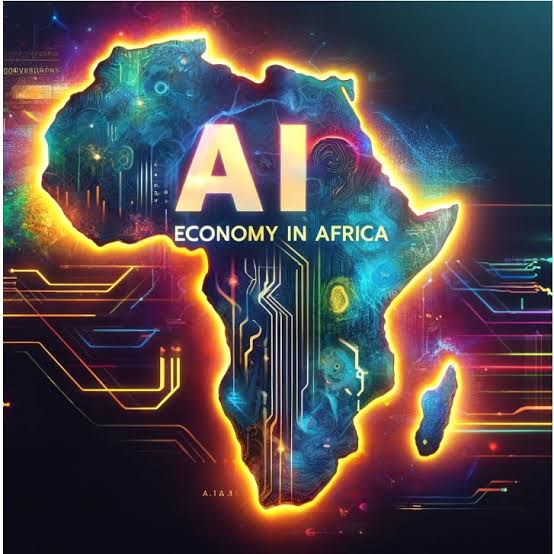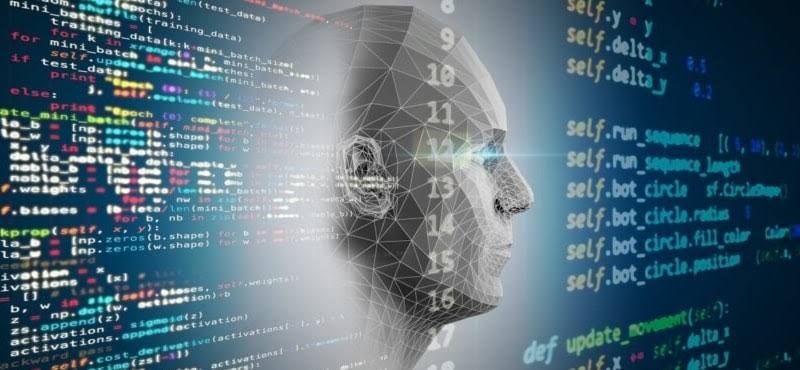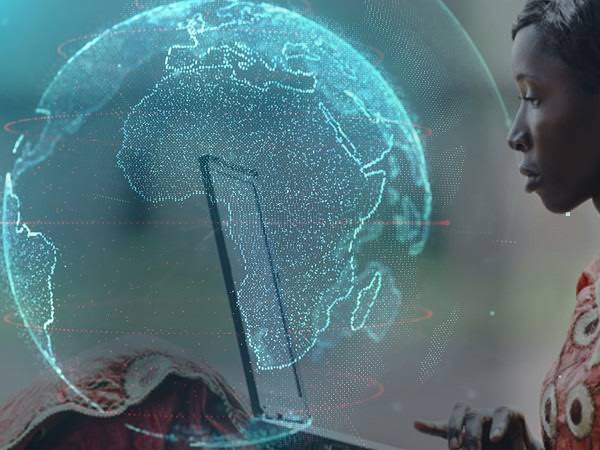Africa’s AI Moment: Are We Innovating or Just Consuming?

INTRODUCTION: THE ALGORITHM HAS LANDED
From diagnosing illnesses in rural hospitals to powering chatbots in local languages, artificial intelligence is no longer a distant future for Africa, it’s here, embedded in classrooms, fintech platforms, farming apps, and public services, AI is reshaping how Africans live, learn, and earn.
But beneath the wave of innovation lies a critical question: Who’s building the tools behind the transformation?

Photo Credit : ARTiba
As the global AI arms race accelerates, Africa stands at a crossroads. Will the continent remain a passive consumer of imported algorithms, shaped by Silicon Valley’s logic and language? Or will it seize this moment to build indigenous AI, rooted in local problems, powered by African data, and reflective of its unique cultures?
This isn’t just a technological debate. It’s a question of sovereignty, opportunity, and self-determination in the digital age.
THE CURRENT LANDSCAPE: Africa Meets Ai
A. Rising Adoption
Artificial Intelligence is quietly embedding itself into everyday African life. In agriculture, AI-powered drones and apps help farmers detect crop diseases early, predict yields, and optimize irrigation. Health tech startups are deploying machine learning to assist with diagnostics in areas short on doctors. Fintech companies are using AI to flag fraud, automate customer service, and assess creditworthiness for the previously unbanked. In education, AI chatbots and adaptive learning platforms are tailoring content to students' pace and language.
The growth is being noticed. Tech giants are placing their bets on the continent.
This wave of adoption signals opportunity but also reveals imbalances.
B. Data Is the Fuel—But Who Owns It?
AI runs on data, and Africa is producing it in torrents, through mobile transactions, online searches, biometric IDs, and social media. But much of this data is harvested and analyzed by companies headquartered outside the continent. African startups often rely on APIs and cloud services operated by foreign firms, meaning sensitive user data can end up in U.S. or European servers.
With limited enforcement of data protection regulations and inconsistent digital sovereignty policies across countries, Africa risks becoming a raw data exporter, feeding the algorithms of others while missing out on the value they generate.
The question looms large: Can Africa develop the regulatory muscle and technical capacity to control its own data before it’s locked out of its own AI future?
LOCAL INNOVATION: Spotlight On Builders
A. The Homegrown AI Scene
While Africa often consumes AI tools developed elsewhere, a growing number of local innovators are flipping the script—designing intelligent systems tailored to African contexts:
Ubenwa (Nigeria): This startup uses AI to analyze a baby’s cry and detect signs of birth asphyxia, a leading cause of neonatal death. It offers a low-cost, early diagnostic tool especially useful in rural clinics where specialist care is scarce.
Zindi (Pan-Africa): A vibrant data science competition platform that crowdsources solutions to real African problems from predicting crop yields to optimizing traffic. Zindi is also cultivating a pipeline of African AI talent by connecting data scientists with organizations in need of insights.
Cure Bionics (Tunisia): This startup is building affordable, AI-driven 3D-printed prosthetic limbs for amputees in Africa. Their smart prosthetics adapt to user behavior and are designed with affordability and accessibility in mind.
These aren’t copycat projects—they’re original, context-aware, and deeply needed.
B. Challenges for Local Innovators
Despite their promise, African AI builders face structural and financial obstacles:
Funding Gaps: Most AI startups struggle to secure early-stage capital. Global investors still see African innovation as high-risk, and local VC ecosystems are underdeveloped.
Hardware Barriers: Training large AI models requires powerful computing (especially GPUs), which remain expensive and hard to access. Most startups rely on cloud services priced in dollars, pushing up costs in fragile economies.
Talent Shortage: While interest in AI is growing, Africa faces a scarcity of highly trained AI researchers, data engineers, and machine learning specialists. Brain drain only deepens the gap.
Dependency on Foreign Models: Many startups rely on open-source AI frameworks (like GPT, BERT, or Stable Diffusion) developed and hosted outside Africa. While these tools lower entry barriers, they also tether local innovation to global tech platforms—and limit control over data pipelines, ethics, and customization.
In short, Africa is innovating but its builders are fighting an uphill battle for infrastructure, autonomy, and recognition.
THE NEW TECH COLONIALISM?
A. Silicon Valley’s Shadow
While AI tools increasingly power African classrooms, clinics, farms, and financial systems, many of those tools come preloaded with assumptions, cultural, linguistic, and economic that don’t reflect African realities. This is not just a gap; it’s a growing form of technological dominance.
Language Exclusion: Major large language models (LLMs) from ChatGPT to Google’s Gemini struggle with most African languages. Out of over 2,000 indigenous languages on the continent, only a handful (like Swahili or Yoruba) receive marginal representation, and even then, often poorly.
Bias in the Algorithm: Western-trained AI systems frequently misinterpret African names, accents, and images. For example, voice assistants may fail to understand African English accents, while facial recognition tools show higher error rates for darker skin tones.
As Africa becomes one of the fastest-growing data sources on the planet, the continent must ask: Who benefits most from this new digital extractivism?
B. Infrastructure & Ownership Gaps
Behind every AI tool is a chain of control,bwho builds it, who trains it, who hosts it, and who profits.
Cloud Dependency: Africa still lacks strong local data infrastructure. Most cloud storage and AI pipelines are hosted outside thr continent. This raises not just cost issues, but data sovereignty concerns.
No Local Control: If the back-end servers are foreign-owned, the foundational models are trained elsewhere, and the revenue goes offshore, can Africa truly own its AI future?
The risk isn’t just economic—it’s epistemic. If the tools that shape our thinking, speech, identity, and imagination are controlled by outside actors, then so too is our future.
ETHICS, EQUITY, AND EXPLOITATION
A. Biased Models
Artificial Intelligence may feel cutting-edge, but beneath the surface lies a web of inequity where African bodies and brains power systems they’ll never truly own. AI-powered surveillance and security tools, trained primarily on lighter-skinned datasets, routinely misidentify African faces. Studies have shown error rates for dark-skinned individuals can be up to 35% higher than for white counterparts—raising concerns not just of bias, but of policing injustice and wrongful surveillance.
B. Legal & Policy Lag
While the world debates AI ethics in Geneva and Silicon Valley, many African nations are playing catch-up without a unified or enforceable framework to guide responsible innovation.
Policy Vacuums: Only a handful of African countries (like Egypt, South Africa, and Kenya) have formal AI strategies—and even fewer have legal enforcement mechanisms in place for ethical breaches, surveillance misuse, or data privacy violations.
No Continental Alignment: Despite growing calls, the African Union lacks a binding AI governance framework, meaning there's no common standard for data ethics, algorithmic fairness, or responsible AI deployment.
As foreign firms race to test AI pilots across the continent, the absence of clear rules leaves African citizens vulnerable not just to tech failure, but to digital exploitation at scale. The question now is whether Africa will shape its AI ethics or be shaped by someone else’s.
THE ROAD AHEAD: Build Or Be Built?
A. What Africa Needs
Africa stands at a digital crossroads: either invest in building its own AI ecosystem or risk being permanently shaped by external algorithms and interests.
To tilt the future in its favor, the continent must act now. Governments must allocate serious funding toward AI infrastructure, research labs, supercomputing access, open datasets, and training programs. To ensure AI works for Africans, tools must be trained on African realities. This means prioritizing language inclusion, local dialects, cultural nuance, and regional datasets that reflect the diversity of Africa’s people and problems.
AI Literacy and Human Capital: Without widespread education in AI ethics, coding, and data science, Africa’s youth will remain consumers, not creators. Governments and universities need to embed AI into school curricula and vocational training.
Cross-Sector Collaboration: Startups, universities, and policymakers must work in synergy to drive indigenous innovation—breaking down silos that often limit knowledge exchange.

Photo Credit: Africa Researchers Magazine
B. Continental Momentum
Fortunately, the pieces are starting to come together.
The African Union’s Digital Transformation Strategy (2020–2030) explicitly identifies AI as a critical lever for inclusive development from agriculture to education to health.
Pan-African think tanks and civil society groups are also pushing for an AI governance charter grounded in African values, emphasizing rights, equity, and shared prosperity over surveillance capitalism.
The challenge now is speed and scale. The AI train has left the station globally. If Africa doesn’t build its own carriage, it may ride in someone else’s without knowing where it's headed.
You may also like...
When Sacred Calendars Align: What a Rare Religious Overlap Can Teach Us

As Lent, Ramadan, and the Lunar calendar converge in February 2026, this short piece explores religious tolerance, commu...
Arsenal Under Fire: Arteta Defiantly Rejects 'Bottlers' Label Amid Title Race Nerves!

Mikel Arteta vehemently denies accusations of Arsenal being "bottlers" following a stumble against Wolves, which handed ...
Sensational Transfer Buzz: Casemiro Linked with Messi or Ronaldo Reunion Post-Man Utd Exit!

The latest transfer window sees major shifts as Manchester United's Casemiro draws interest from Inter Miami and Al Nass...
WBD Deal Heats Up: Netflix Co-CEO Fights for Takeover Amid DOJ Approval Claims!

Netflix co-CEO Ted Sarandos is vigorously advocating for the company's $83 billion acquisition of Warner Bros. Discovery...
KPop Demon Hunters' Stars and Songwriters Celebrate Lunar New Year Success!

Brooks Brothers and Gold House celebrated Lunar New Year with a celebrity-filled dinner in Beverly Hills, featuring rema...
Life-Saving Breakthrough: New US-Backed HIV Injection to Reach Thousands in Zimbabwe

The United States is backing a new twice-yearly HIV prevention injection, lenacapavir (LEN), for 271,000 people in Zimba...
OpenAI's Moral Crossroads: Nearly Tipped Off Police About School Shooter Threat Months Ago
ChatGPT-maker OpenAI disclosed it had identified Jesse Van Rootselaar's account for violent activities last year, prior ...
MTN Nigeria's Market Soars: Stock Hits Record High Post $6.2B Deal

MTN Nigeria's shares surged to a record high following MTN Group's $6.2 billion acquisition of IHS Towers. This strategi...





